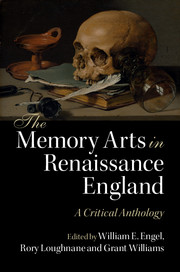Book contents
- Frontmatter
- Dedication
- Contents
- List of figures
- Acknowledgements
- A note on abbreviations
- Introduction
- PART I The art of memory
- PART II Rhetoric and poetics
- PART III Education and science
- PART IV History and philosophy
- PART V Religion and devotion
- Introduction to Part V
- V.1 Thomas More, A Treatise (Unfinished) upon these Words of Holy Scripture (1522)
- V.2 John Foxe, Acts and Monuments (1563)
- V.3 Thomas Playfere, The Pathway to Perfection (1593)
- V.4 Joseph Hall, selected works
- V.5 Richard Day, A Book of Christian Prayers (1608)
- V.6 Daniel Featley, ‘Four Rows of Precious Stones’ (1610)
- V.7 Lewis Bayly, The Practice of Piety (1613)
- V.8 John Donne, ‘Sermon, preached at Lincoln's Inn’ (1649)
- V.9 Stephen Jerome, A Minister's Mite (1650)
- V.10 E.M., Ashrea (1665)
- PART VI Literature
- Index
- References
V.8 - John Donne, ‘Sermon, preached at Lincoln's Inn’ (1649)
from PART V - Religion and devotion
Published online by Cambridge University Press: 05 August 2016
- Frontmatter
- Dedication
- Contents
- List of figures
- Acknowledgements
- A note on abbreviations
- Introduction
- PART I The art of memory
- PART II Rhetoric and poetics
- PART III Education and science
- PART IV History and philosophy
- PART V Religion and devotion
- Introduction to Part V
- V.1 Thomas More, A Treatise (Unfinished) upon these Words of Holy Scripture (1522)
- V.2 John Foxe, Acts and Monuments (1563)
- V.3 Thomas Playfere, The Pathway to Perfection (1593)
- V.4 Joseph Hall, selected works
- V.5 Richard Day, A Book of Christian Prayers (1608)
- V.6 Daniel Featley, ‘Four Rows of Precious Stones’ (1610)
- V.7 Lewis Bayly, The Practice of Piety (1613)
- V.8 John Donne, ‘Sermon, preached at Lincoln's Inn’ (1649)
- V.9 Stephen Jerome, A Minister's Mite (1650)
- V.10 E.M., Ashrea (1665)
- PART VI Literature
- Index
- References
Summary
About the author
John Donne (1572–1631) was a poet and Church of England clergyman. He was born in London, educated at Hart Hall, Oxford (now Hertford College) and received legal training at Lincoln's Inn. Donne found work as a soldier, a secretary, a professional author (seeking patronage) and Member of Parliament, before finally accepting a role in the Church of England, rising to the eminent position of Dean of St Paul's. Although best known now for his dazzlingly inventive ‘metaphysical’ poems, with their extended metaphors and elaborate conceits, in his own day Donne was a celebrated preacher.
About the text
This excerpt derives from Donne's second sermon discussing Psalm 38, in which a penitent David chastises himself for his sins and asks for God's support (‘be not far from me’), for his ‘iniquities’ are ‘too heavy’ a burden for him. The sermon was included in a collection of fifty of Donne's sermons, first printed in 1649, eighteen years after Donne's death. It is not known when the sermon was first preached, but it almost certainly dates from the late 1610s or early 1620s when Donne was employed as preacher by the Lincoln's Inn Society. Potter and Simpson date the series of sermons about Psalm 38 to the spring or summer of 1618, based on a reference to the construction of a new chapel at Lincoln's Inn in the sermon on verse 9 (‘Introduction’, pp. 13–14). Donne's congregation for sermons at the Inns of Court would have largely consisted of members of the Inn, including ‘the benchers (the governing body of the Society), the barristers, and also the students’ (Rhatigan, p. 109).
The arts of memory
Donne often makes recourse to the art of memory in his sermons. For example, in a sermon on Psalm 90:14, preached at St Paul's, Donne compares the distinct words of that verse (and, thus, the order of the sermon) to ‘land-marks that must guide you [i.e. the listener] in this voyage and the places to which you must resort to assist your memory be pleased to take another survey and impression of them’ (Zzz2v).
- Type
- Chapter
- Information
- The Memory Arts in Renaissance EnglandA Critical Anthology, pp. 260 - 264Publisher: Cambridge University PressPrint publication year: 2016



